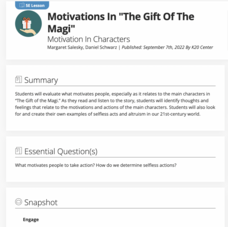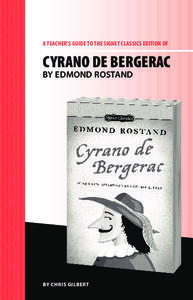Penguin Books
A Teacher's Guide to the Signet Classics Edition of Heart of Darkness by Joseph Conrad
A teacher's guide to Joseph Conrad's Heart of Darkness proves that it is not impossible to delve into the heart of darkness. Containing a wealth of information about Conrad, the Scramble for Africa, and the history of the Belgian Congo,...
K20 LEARN
"The Interlopers": Are You Ready to Rumble? Conflict, Motivation, and Setting
Capulets and Montagues. Sharks and Jets. Nortenos and Surenos. Gradwitzes and Znaeyms? Hector Hugh Munro's short story "The Interlopers" invites high schoolers to consider the causes of conflicts and reflect on what it takes to resolve...
K20 LEARN
It Wasn't Me: "The Crucible"
Scholars complete their study of the collective fear in Arthur Miller's "The Crucible" by conducting a mock trial to determine how many witches are in the class. Groups then analyze sections of the play for the literary devices used and...
K20 LEARN
Motivations In "The Gift Of The Magi": Motivation In Characters
O. Henry's short story, "The Give of the Magi," launches a study of what motivates people to act as they do. Class members identify what they believe are the motivations of the characters in O. Henry's tale and then craft a one-page...
Curated OER
"The Story of an Hour" Lesson 2: Teacher's Guide and Notes
After reading background information about Kate Chopin, pupils complete their shared reading of her short story, "The Story of an Hour." Participants then consider the irony of the ending.
K20 LEARN
Criminal Motivations: Irony and Characterization In "The Cask Of Amontillado"
Edgar Allan Poe's short story "The Cask of Amontillado" is a bit of a puzzle. Critics have long debated Montresor's motives for killing Fortunato. Young scholars examine examples of the three types of irony (verbal, dramatic, and...
Penguin Books
A Teacher's Guide to the Signet Classic Edition of Edith Wharton's Ethan Frome
Is it possible to have too much concern for others? Can we be trapped by our expectations as well as those of society? Edith Wharton's chilling tale of Ethan Frome asks these and other disquieting questions. Signet's guide to Ethan Frome...
Penguin Books
A Teacher's Guide to the Signet Classics Edition of Cyrano de Bergerac by Edmond Rostand
Edmond Rostand's Cyrano de Bergerac has enjoyed popularity since its debut in 1897 due in large part to the themes it addresses. Instructors planning on using the play with their classes will find much to like in this teaching guide. The...
Penguin Books
A Teacher's Guide to the Signet Classic Edition of George Orwell's Animal Farm
Not all teacher's guides are equal, but some are pretty good. This guide for George Orwell's Animal Farm includes chapter synopses, chapter-by-chapter discussion questions, journal and essay prompts, and suggestions for various activities.
Penguin Books
A Teacher's Guide to the Signet Classic Edition of William Shakespeare's Othello
Villains populate literature. These dastardly characters serve as a contrast to the hero who they set out to destroy. Iago, the villain of Shakespeare's tragedy Othello, certainly rates as one of the most despicable. Motivated by...
Penguin Books
A Teacher's Guide to the Signet Classic Edition of William Shakespeare's The Taming of the Shrew
A study of The Taming of the Shrew proves to be problematic in contemporary classrooms. Is Shakespeare following Elizabethan conventions or being ironic? What are readers supposed to make of all the hunting imagery? Of Katherine's final...
Penguin Books
A Teacher's Guide to the Signet Classic Edition of William Shakespeare's A Midsummer Night's Dream
A night in the forest, a fairy king and queen, adolescent rebellion, magic potions, love triangles, a funny play about a tragedy, a plot that, rather than running smooth, runs amok? Of course, 'Twould be a guide for teaching...
Penguin Books
A Teacher's Guide to the Signet Classic Edition of William Shakespeare's Twelfth Night
With the help of this teacher's guide, it won't take 12 nights for scholars to complete their study of William Shakespeare's romantic comedy about twins Viola and Sebastian. Pompous prigs, he shes, fatuous fools, and lovelorn lovers...
Simon & Schuster
Curriculum Guide to: Adventures of Huckleberry Finn by Mark Twain
Five lessons make up a curriculum guide to The Adventures of Huckleberry Finn. Readers find examples of Twain's use of irony, closely examine Huck's colloquial language, as well as his sense of morality, and identify themes in the novel....
Montgomery Public Schools
Romeo and Juliet Study Packet
William Shakespeare's Romeo and Juliet, a play about star-crossed lovers, resonates deeply with teenagers. The study packet contains study questions for each act of the play. Learners use a graphic organizer to analyze whether characters...
Chandler Unified School District
Satire: The Art of Indirect Persuasion
A free press is entitled to its opinions. While the news pages report the facts of events, editorial pages feature writers' and cartoonists' opinions about events to either directly or indirectly persuade. Introduce viewers to the art of...
Brooklyn College
Irony, Sarcasm, Satire
Irony, the discrepancy between what is expected and what occurs, is the focus of a reference sheet that provides young writers with models of this literary device.
Vanier College
Analyzing Short Stories/Novels
Good questions can help focus readers' attention on the elements writers use to add depth to their stories. The questions on this worksheet do just that and encourage readers to think critically about a story and author's purpose.
Annenberg Foundation
Gothic Undercurrents
Terror, mystery, excitement. American writers of the 19th century, including Nathaniel Hawthorne, Herman Melville, and Emily Dickinson, used these elements to create morally ambiguous tales that challenged the prevailing belief in...
Scholastic
Identifying Types of Irony Using "The Gift of the Magi"
O. Henry's "The Gift of the Magi" is the classic example of irony in literature. Teach young writers about the ways irony can engage their readers with an activity in which they write scripts using dramatic irony, situational irony, and...
Scholastic
Pre-Reading Vocabulary Activities Using "The Gift of the Magi"
The rich language of O. Henry's "The Gift of the Magi" is only appreciable if you understand the words. A short lesson reviews 13 words from the story and prompts class members to apply each word and its definition to other situations.
EngageNY
Grade 9 ELA Module 1: Unit 3, Lesson 11
The study of Romeo and Juliet continues as pairs use the provided summary tool worksheet to record evidence of how Shakespeare uses dramatic irony to heighten the tension in Juliet's soliloquy in Act 3, scene 2, lines 1–31.
Curated OER
Identifying Irony
What are the three types of irony? After reviewing dramatic, situational, and verbal irony with your readers, present them with this two-page document. They read six excerpts to determine which type of irony is used in each. After...
Curated OER
Literary Techniques
Need to review literary terms/techniques with your class? The slides in this presentation define and give examples of 22 common literary terms. The PowerPoint could be used for AP test prep.

























